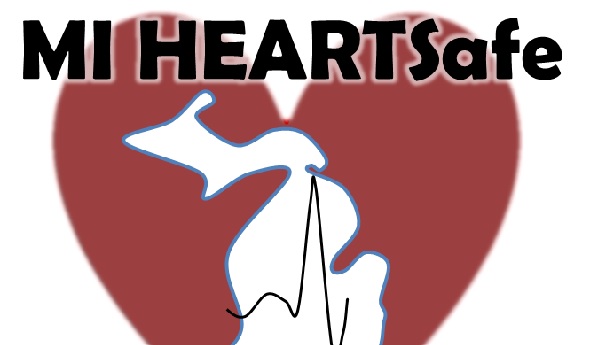
105 Schools Recognized As HEARTSafe
October 19, 2016
The Michigan Departments of Health and Human Services (MDHHS), and Education (MDE); American Heart Association (AHA); Michigan High School Athletic Association (MHSAA); and Michigan Alliance for Prevention of Sudden Cardiac Death of the Young (MAP-SCDY) have awarded 105 schools in Michigan with the MI HEARTSafe School designation which recognizes schools that are prepared to respond to cardiac emergencies.
“Many sudden cardiac deaths that claim the lives of children and young adults could be prevented through screening, detection, and treatment,” said Dr. Eden Wells, chief medical executive of MDHHS. “Appropriate medical response within three to five minutes is crucial for increasing the chance of survival, which is why I’m pleased to see so many of our schools taking vital measures to prepare and address this health issue.”
In order for a school to receive a MI HEARTSafe School designation, it must perform at least one cardiac emergency response drill per year, have a written medical emergency response plan and team, have current CPR/AED certification of at least 10 percent of staff, 100 percent of head varsity coaches, and 50 percent of P.E. staff; have accessible, properly maintained and inspected AEDs with signs identifying their location; and ensure pre-participation sports screening of all student athletes using the current physical and history form endorsed by the Michigan High School Athletic Association.
“We are so proud to support Michigan’s HEARTSafe schools,” said State Superintendent Brian Whiston. “Ensuring schools are prepared for sudden cardiac emergencies through planning, training, and life-saving AEDs is an important part of having safer learning environments for students, staff, and the community.”
Between 2003 and 2012 in Michigan, there were 2,590 young individuals between 1 and 39 years of age who died of sudden cardiac death. Of those, 214 were between 5 and 19 years of age. This is the third year of the MI HEARTSafe Schools program in Michigan. In the first two years of the initiative, 162 schools were previously designated as MI HEARTSafe Schools and prepared to help reduce the number of sudden cardiac deaths in our youth.
Public Act 12 of 2014 requires all schools (grades kindergarten to 12) to have a cardiac emergency response plan in place. This MI HEARTSafe School designation recognizes the 267 school buildings that have taken steps above and beyond to prepare to respond in the event of a cardiac emergency, and is awarded for a period of three years. Click for the list of designated schools.
Schools that meet all of the requirements will be able to apply for the MI HEARTSafe School designation each year. Click for information about the MI HEARTSafe Schools program.

MHSAA, MHSFCA to Provide Spring Evaluation Camps for College Football Hopefuls
By
Geoff Kimmerly
MHSAA.com senior editor
March 27, 2023
The Michigan High School Athletic Association, in partnership with the Michigan High School Football Coaches Association (MHSFCA), will be hosting first-ever Spring Evaluation Camps to provide athletes with aspirations of playing college football opportunities to show their skills and abilities to college coaches at one of five locations.
The one-day camps will take place between May 15-18 at Jenison High School, DeWitt High School, Jackson High School, Brighton High School and Detroit Country Day High School. The MHSAA’s involvement will allow for the opportunity for Division I college coaches to attend, and representatives from college football programs at all levels are expected.
Athletes who will be juniors or seniors in Fall 2023 may register to participate via a link on the Football page.
“This is an attempt by the MHSAA to help our athletes get exposure during the spring evaluation period in a way that does not intrude on spring sports,” said Brad Bush, an MHSAA assistant director and past high school and college football coach. “We are working with the MHSFCA to help put together a first-class experience for the athletes and college coaches.”
Cost is $20 per player, and each registrant will receive a shirt to wear based on the athlete’s graduation year and registration number so college coaches in attendance can monitor their camp performance. College coaches also will receive registration information for each athlete in attendance.
All athletes must have a coach from the athlete’s school staff present at the camp, and that coach must be a member of the Michigan High School Football Coaches Association.
MHSFCA executive director Andrew Pratley called the Spring Evaluation Camps a tremendous opportunity for high school athletes in Michigan.
“We are very excited with the partnership with the MHSAA that allows our kids the opportunity to wear a helmet and do drills in front of college coaches in the spring at a minimal cost,” Pratley said. “College coaches are thrilled, and it's a unique opportunity to have the rules waived by the MHSAA at these events only in order to showcase the tremendous talent all over the great state of Michigan.”
The Michigan High School Football Coaches Association (MHSFCA) has been devoted to the promotion of high school football since its inception in March 1972. The MHSFCA has more than 2,500 members and provides several educational and development opportunities for members and their athletes, including an annual coaching clinic, an annual leadership conference for coaches and potential team captains, and the annual summer East-West All-Star Game for graduated seniors. Additionally, the MHSFCA’s Leadership Development Alliance is in its third year of training coaches and offering veteran members of the association as mentors.
The MHSAA is a private, not-for-profit corporation of voluntary membership by more than 1,500 public and private senior high schools and junior high/middle schools which exists to develop common rules for athletic eligibility and competition. No government funds or tax dollars support the MHSAA, which was the first such association nationally to not accept membership dues or tournament entry fees from schools. Member schools which enforce these rules are permitted to participate in MHSAA tournaments, which attract more than 1.3 million spectators each year.

